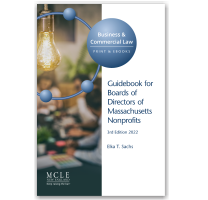Guidebook for Boards of Directors of Massachusetts Nonprofits
Essential tool for board compliance and accountability

- Product Number: 2050183EBK
- Publication Date: 8/25/2022
- Edition: 3rd Edition 2022
- Copyright: © 2022 MCLE, Inc.
-
Add to Favorites List
Choose Format:
-
Product Description
Product Description
Designed as an essential resource to assist nonprofit board members in fulfilling their roles, the Guidebook for Boards of Directors of Massachusetts Nonprofits is filled with best practices, case scenarios and sound advice. It is a useful tool for avoiding liability; governing ethically and carrying out the mission of nonprofit organizations. Beginning with an in-depth review of the nature of a nonprofit and the documents necessary to its corporate existence and governance, the Guidebook goes on to explain how nonprofit board members are selected; who can (and should) serve; the functions of the board; the potential for board member liability; and the nature and enforcement of board members' fiduciary duties. Featured is a clear explanation of the basics of tax exemption that every board member must know; including state and local exemptions and disclosure requirements for tax-exempt entities.
Recent updates:
-
Update: August 2022
Dear Subscriber:
Thank you for choosing to keep current regarding the governance of not-for-profit entities by choosing this 2022 edition of the Guidebook for Boards of Massachusetts Nonprofits . Among the new material included in this edition of the Guidebook are the following topics:
- The power to amend bylaws in a membership corporation. See chapter 1 for practical tips, which also address the instance where the articles of organization provide the board with a concurrent power to amend.
- Conflicts of interest. See chapter 2 for an updated Practice Note addressing requirements for minutes where a board member has a conflict of interest with respect to a matter under consideration.
- Tax exemption. See chapter 4 for new material regarding applying for an exemption under Section 501(c)(3), including the specific forms that must be submitted online through the IRS's electronic filing website.
- Private foundations. Chapter 4 lists updated restrictions and taxes applicable to private foundations.
- Private benefit; private inurement. Chapter 4 also discusses the definition of a “disqualified person,� i.e., any person who is currently or was at any time during the five-year period ending on the date of the excess benefit transaction in a position to exercise substantial influence over the affairs of the organization.
- Exemptions from local property tax. See chapter 4 for tips on how to apply for an exemption on local property taxes, what applications are necessary, and where to file. Different preferences of municipalities are noted.
We at MCLE trust that you will find this new material useful in your law practice, and valuable in keeping your law library up to date.
Cordially,
Maryanne G. Jensen, Esq., MCLE Director of Publications
-
Update: August 2022
-
Table of Contents
Table of Contents
expand allChapter 1 expandThe Nonprofit Corporation—A Primer
Buy Chapter Chapter 2 expand
Chapter 2 expandThe Nonprofit Board—Some Essentials
Buy Chapter Chapter 3 expand
Chapter 3 expandThe Duties and Liabilities of Nonprofit Board Members
Buy Chapter Chapter 4 expand
Chapter 4 expandTax Exemptions for Nonprofits
Buy Chapter Appendix
AppendixAdditional Sources of Information
Buy Chapter
- Editors & Authors

